- Home
- Lynne Reid Banks
The Warning Bell
The Warning Bell Read online
THE WARNING BELL
Lynne Reid Banks
In memory of Pat, my mother
Table of Contents
PROLOGUE
PART ONE
CHAPTER ONE
CHAPTER TWO
CHAPTER THREE
CHAPTER FOUR
CHAPTER FIVE
CHAPTER SIX
CHAPTER SEVEN
CHAPTER EIGHT
PART TWO
CHAPTER NINE
CHAPTER TEN
CHAPTER ELEVEN
CHAPTER TWELVE
CHAPTER THIRTEEN
CHAPTER FOURTEEN
CHAPTER FIFTEEN
CHAPTER SIXTEEN
CHAPTER SEVENTEEN
PART THREE
CHAPTER EIGHTEEN
CHAPTER NINETEEN
CHAPTER TWENTY
CHAPTER TWENTY-ONE
CHAPTER TWENTY-TWO
CHAPTER TWENTY-THREE
CHAPTER TWENTY-FOUR
CHAPTER TWENTY-FIVE
CHAPTER TWENTY-SIX
CHAPTER TWENTY-SEVEN
PART FOUR
CHAPTER TWENTY-EIGHT
CHAPTER TWENTY-NINE
CHAPTER THIRTY
CHAPTER THIRTY-ONE
CHAPTER THIRTY-TWO
CHAPTER THIRTY-THREE
OTHER NOVELS BY LYNNE REID BANKS
PROLOGUE
In a comfortably proportioned, but lately very empty-feeling, flat behind the Finchley Road lives a middle-aged woman called Maggie Langham.
Under her maiden name of Margaret Robertson, she was a moderately unsuccessful actress. Under her first-married name of Margaret Macrae, she was better known. When she visits the shops in Swiss Cottage, she is still occasionally recognised.
‘Didn’t you used to be on telly?’
‘Years ago.’
‘Yes… A lot younger then, weren’t you? When was it anyway?’
‘In the sixties.’
‘As what, exactly? Not acting, were you, as I remember — more sort of —?’
‘I was a television news reporter.’
‘Oh! Was that before Angela Rippon then?’
‘Long before.’
‘Funny… Always thought she was the first woman on the News.’
‘No.’
‘Can’t remember anything you actually did… What do you do now?’
‘Oh … nothing very much.’ And she has to restrain herself from adding, ‘I’m a widow,’ as if that, being a full-time occupation, excused her from having no other.
No other full-time work, but, despite the debilitation of grief, she dare not be idle. She does all sorts of jobs, paid and unpaid, though the second sort has scant appeal. It is psychologically as well as financially essential for her to earn her living.
And recently, something extraordinary happened to her. More to remind herself that she was still alive than out of any concrete hope, she’d obeyed a strange impulse and put herself back in Spotlight, the actors’ directory — needless to say, not in the juvenile section, whence she’d vanished thirty years ago, but among the character women. And — incredibly — she got a part, a jolly, strident Yorkshirewoman in a Priestley revival at Colchester.
Her mother, now eighty-eight, travelled down from Edinburgh with her grandson Matthew (Maggie’s son) and his new wife, Maggie’s elder brother Ian and his wife and daughter — and her mother’s companion, now, like Maggie, in her fifties, but as beautiful and startling as ever in her bright flowing robes and an elegant turban headdress. Even Maggie’s younger brother Steven flew over from Paris with his partner. They crowded the little theatre’s front row. One would have thought it was a great West End debut.
What it was, for Maggie, was a hard-won triumph over almost unendurable terror and even more formidable inertia. The gathering of the clan didn’t exactly make the occasion less nerve-wracking. But when they crowded into her tiny dressing-room afterwards, going right over the top with armfuls of flowers and champagne, Maggie understood that they loved her and were proud of her comeback from the wilderness of bereavement and ‘the years between’. In their eyes, this far outweighed the fact that her performance had been — to be charitable — somewhere just on the right side of adequate.
When they’d all gone home and the two-week run had ended, dumping her back in Swiss Cottage, Maggie did some uncharacteristically rigorous stocktaking. The brouhaha about the play had not blinded her to the fact that she had made pretty much a mess of her life, and that her present profound loneliness was only her due. Of course, it wasn’t her fault that her adored husband had died comparatively young. On the other hand, it wasn’t to her particular credit that she had had those wholly unexpected years of married happiness. Sheer luck, really… Luck to have met him: fabulous luck that he fell in love with her, against all the odds… Yet even this late-coming worldly portion she had gained at some cost.
Tanya hadn’t come to the play. Maggie had not seen her for the length of her marriage. The only personal contact had been some white flowers, at the time of the funeral — a huge sheaf of gladioli and lilac and roses, giant blooms that looked as if Tanya herself, with her genius for flowers, had grown them. No message beyond a card: ‘To Maggie from Tanya’. Flowers for the living, not the dead… It was balm, of a kind, to the old wound, but Maggie no longer deceived herself. Tanya was not going to reappear to help her through the lonely years. Maggie had bought her marriage with Tanya’s friendship.
Mary Robertson, Maggie’s mother, once said, ‘You know, Maggie, the vainest and most futile mental exercise in the world is tracing back some accident or blunder to its origins, and letting one’s heart gnaw itself in regret that one didn’t know what was going to result. You know: “If I hadn’t gone there, met so-and-so, done this or not done that…” One’s whole life can turn on some tiny thing. It’s not fair. There ought to be a bell, a warning bell, sounding at dangerous corners. But there never, never is.’
But Maggie, on reflection, decided that there very often is a warning bell. It may not go clang-clang with great noisy obviousness. But it rings in other ways. She could remember many turning-points in her own life that were marked by bells of a sort. Her innumerable blunders had not resulted from an absence of bells, but her wilfulness in ignoring them.
Sometimes she had rung the bell herself. Not Maggie so much as Margaret. For Maggie, like many of her generation, was effectively two women. She had always been aware that, although she felt like a Maggie, she had a definite Margaret sitting on her shoulder breathing down her neck, or to be more exact, crouching, stiff, watchful and censorious, inside her head. It was significant that her father was the only one in her family who persisted in calling her Margaret, for Margaret was his creation. Maggie was an extract, at first a sort of protoplasm drawn out of Margaret, quivering with insecurity, but gradually firming up, by infinitely slow accretions, into the real person, fully materialised, leaving Margaret in the role of powerful and resentful succubus.
PART ONE
CHAPTER ONE
Maggie’s parents had married late. Her brother Ian was born when Mary Robertson was already thirty-four, and was given a strict upbringing, as befitted the eldest son of a rigorously Presbyterian father who expected him to follow his footsteps into the long-established family business, which was papermaking.
But this strictness, and the religion that backed it, happened to suit Ian. He was that type of child. He loved routine and order and tradition, and the biggish, rather gloomy stone house in Penicuik, outside Edinburgh, where he grew up. It was one of the largest houses in the little town, and that gave Ian honest satisfaction. It didn’t occur to Maggie’s older brother for many years that there was anything wrong in being satisfied with every aspect of
himself and his life, so long as he fulfilled its rules as laid down by his father and his church.
If Mr and Mrs Robertson had stopped at Ian, their lives would have been quite untrammelled, and Mr Robertson would have died a proud and happy man. But in such families, a single son and heir, however satisfactory, is not enough. A back-up son and a daughter to fulfil the woman’s role in the household are considered desirable. So, at the age of thirty-seven, Mrs Robertson dutifully gave birth to Margaret, and a year later, to Steven.
Mary Robertson loved all her children equally. But Maggie was a little more equal in her affections than the others. She would in any case, left to herself, have been more easy-going with her two youngest.
However, their father saw to it that the younger children received precisely the same raising as Ian, simply because he knew that was the correct way to bring up children, so that no softening or bending was possible. The trouble was that what suits one child grates upon another; where Ian had fallen in with his father’s fixed ideas because they suited his temperament, Maggie and Steven (whose family nickname was Stip) chafed and rebelled.
When Maggie announced her intention of going on the stage, in the second year after World War II when she was eighteen, her father — then approaching his sixties and locked in his puritan ethic like a neatly-carapaced beetle in an epoxy paperweight — was no less furious and appalled than his own father would have been, a generation earlier.
Maggie was not expected to entertain notions of a career for herself at all. Her brothers would attend to the family paper business; Maggie — Margaret — was expected to stay at home and help her mother and look forward to being the comfort and prop of her parents in their old age. Unless, of course, she should happen to marry; but that was not really on the programme.
Not because she had no looks. All the women in her family were ‘comely’, with the same dark, strong, curly hair, bright blue eyes and apple cheeks, not to mention sturdy, wide-hipped, high-breasted figures — made, one would say, for child-bearing, though a number of them never got a chance to prove it.
If you live in a small provincial Scottish town, keeping to a rigid schedule of early rising and early retirement with the intervening periods constantly filled with hard and useful work; if you are brought up on the Christian ethic that lays heavy stress on the second commandment; if your parents treat modern institutions such as dating, dancing, cinema-going and social drinking with the gravest suspicion, they cannot be accused of throwing you on to the marriage market.
Probably it was these dour facts of her life, rather than an innate need to express her histrionic gifts, which caused Maggie’s reaction to the first theatrical performance she ever saw. Oh, she had seen a few films and amateur shows during the war years — Mr Robertson could hardly have stood out against every modern diversion. But the full-blown professional production of Oklahoma!, which she was taken to at the King’s Theatre, Edinburgh, on her eighteenth birthday, was a revelation to her.
It was not her parents who took her, but her English teacher. This remarkable woman, whose name was Fiona Dalzell, was to have an enormous influence on Maggie’s life. A childless widow, she was all too familiar with the situation of girls like Maggie. She herself was the product of just such a family. She had wrenched herself away in her teens to elope with one of her own teachers, but he died. And as her family refused to forgive her (he was a married man), she had been obliged to make her own way, using the modest education she had had as a basis for further study, and finishing up as an extremely gifted if slightly eccentric and decidedly under-qualified teacher at Maggie’s local high school.
She took a fancy to Maggie and decided to interfere in her life. And she was astute in her meddling. The first step was Oklahoma!. When Maggie asked her, years later, ‘But why a musical?’ she replied, ‘It seemed to me that what you needed was a splash of real colour.’
And this was true. Looking back, Maggie felt that, prior to that night, she had seen everything in black and white — or rather, the sepia tones of the photographs in the heavily-bound family album which lived in a huge, ornate mahogany sideboard in the Robertsons’ dining room. This Victorian monstrosity typified the furnishings of the house; its light-drinking blackness seemed to suck up even sunshine (when it managed to penetrate the thick velour drapes and tight-meshed lace curtains).
Every room contained some minion of that sideboard to do a similar office. All were dedicated to darkening light and deadening colour — the bedheads with their twisted pillars, the tables with their bulbous legs and rack-like stretchers, the immovable black piano that Maggie, in childhood, had supposed knew none but hymn tunes. (This was not as silly as it sounds. It was a pianola, and its rolls were all hymns. No one ever really played it.) Then there was her father’s vast rolltop desk, its innumerable partitions stuffed with all the incomprehensibilia of his boring business life at the papermill, and the bureau-bookcase in the living room, with its glazed doors, arched like cathedral windows, behind which lay dusty volumes, reverently spoken of but never read, for the doors were locked, the key long mislaid and never really searched for.
Even the children’s bedrooms were repositories for the less imposing items inherited from spinster aunts and grandparents over the past hundred years. Maggie’s carpet was a deep, ponderous crimson, its pattern doused by the unbrushable residual dust of the years. Her bedspread was a mere membrane of faded dun on which she was forbidden even to sit, for it had no body left to withstand creases. Nothing in that household was ever discarded until it fell to bits, and in those days (post-war austerity helped a natural inclination to parsimony) nothing ever did, so nothing was ever new, or modern, or frivolous, or fragile except through wear — nor was anything ever bought simply for fun.
It must have been due to this that Maggie could actually get nostalgic for that dreadful style of decor that came in just after the war and was known derisively as ‘Contemp’. At a recent exhibition commemorating the Festival of Britain, Maggie made a beeline for the reconstructed ‘room of the period’ and stood, gazing enraptured at its speckled wallpaper, flimsy cubist-patterned curtains, bits of gimcrack, asymmetrical furniture, yellow figured lampshade and loud rag rugs. ‘Oh, look!’ she breathed to a perfect stranger who was standing next to her gazing at the ‘room’ in horror. ‘Isn’t it fun? How I would have adored a room just like that when I was eighteen!’
Did Mrs Dalzell, sitting beside her protégée in the red-plush stalls on that fateful anniversary, realise that she had done more than translate the monochrome of Maggie’s life into devastating technicolour? As the brave brown men of the chorus tossed their bonneted girls into the air, as ‘the amazing potency of cheap music’ laid its hold on Maggie’s hymn-pickled vitals, stopping her breath, injecting spurts of adrenalin into her system — did her companion know that she might as well have punched her fist through the sacred skin of the Robertson family unit and dragged Maggie bodily out, as if bringing her to birth, at the age of eighteen, by some violent form of Caesarean section?
The music was not amplified to deafening point as it would be these days, but it was loud enough. It filled Maggie’s head, and her heart, to bursting. She wouldn’t have been to blame, this time, for failing to hear the warning bell; she wouldn’t have heard one that night if it had rung as loud as the ones that deafened Quasimodo.
For the next fortnight, Maggie’s mind tossed deliciously upon the high crests of turbulent dreams. She secretly bought the sheet music of Oklahoma! and learnt the songs, picking them out on the old black buttoned-up-spinster piano when no one was at home. Next came the need to share her revelation. She cornered her younger brother and confederate Stip, and after pestering him for a week, finally bribed him into coming with her on a totally illicit outing to see the show again.
Stip, whose own bent at sixteen lay in a soulful literary direction, couldn’t understand what had got into the girl. To defy their parents and risk an almighty row to go to some idiotic American musica
l made little sense to him. But Maggie promised him ten shillings if he would come, to be increased to fifteen if he was prepared to take his oath afterwards that he hadn’t enjoyed it.
They laid down a network of elaborate falsehoods to cover their tracks, and also to screw the excitement of the adventure up to a higher pitch. They said they were going into Edinburgh to visit cousins they had recently met at a wedding, to play tennis and then attend some suitably sombre church-based meeting. Their parents swallowed this tale whole; it was dear brother Ian, at twenty-three just as straight-laced as any parent and twice as dangerous, who smelt a rat, checked with the cousins — and shopped them.
They arrived home at 11.30 p.m. in the highest possible spirits. Stip had refused to accept more than five shillings in the end, and spent that on huge quantities of fish and chips and large draughts of bottled cider after the show.
They stood stock-still on the path leading up to the black, fan-lighted front door, hand in hand like guilty children. Every light downstairs was blazing, an unheard-of extravagance, which instantly alerted them that the game was up.
‘They’ll murder us,’ said Stip hollowly. ‘We’ll be hung, drawn and quartered.’
‘I don’t care,’ said Maggie loudly. ‘I don’t care one damn.’
This was not only the cider speaking. It was Oklahoma!. It was, in particular, a song that lyrically enquires why a woman who is healthy and strong should blubber like a baby when her man goes away. This absolute refusal in advance to have one’s heart broken appeared to Maggie then as the most forthright statement of women’s rights imaginable, and applied, in its way, to daughters vis-à-vis fathers as much as to girls vis-à-vis men. As she marched up the steps, the lyrics were spurring her on: she too would snap her fingers to show she didn’t care, wash her neck, brush her hair, and start all over again. It was time to stand up for herself, to tell them what, during that last exhilarating chorus, she had irrevocably decided to sit no longer tamely in that light-denying house, but to go away and learn to be an actress, so that she could do for others what had been done for her that night.

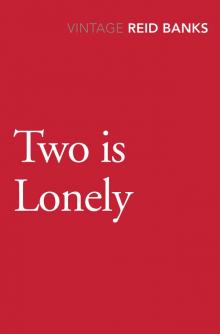 Two Is Lonely
Two Is Lonely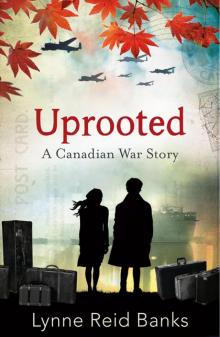 Uprooted - a Canadian War Story
Uprooted - a Canadian War Story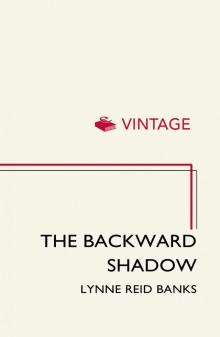 The Backward Shadow
The Backward Shadow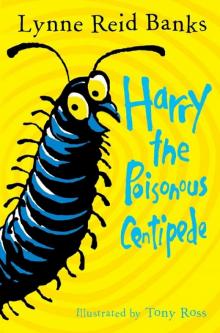 Harry the Poisonous Centipede: A Story to Make You Squirm
Harry the Poisonous Centipede: A Story to Make You Squirm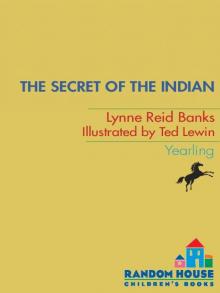 The Secret of the Indian (The Indian in the Cupboard)
The Secret of the Indian (The Indian in the Cupboard)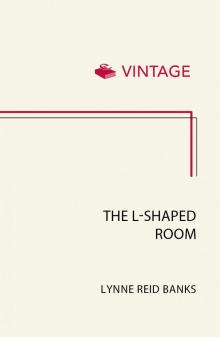 The L-Shaped Room
The L-Shaped Room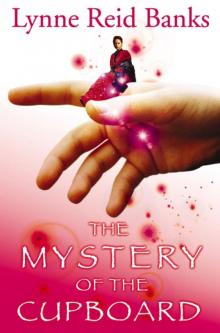 The Mystery of the Cupboard
The Mystery of the Cupboard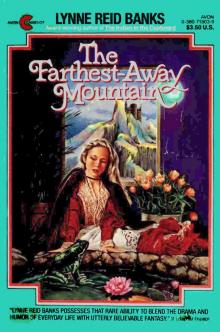 The Farthest-Away Mountain
The Farthest-Away Mountain Harry the Poisonous Centipede Goes to Sea
Harry the Poisonous Centipede Goes to Sea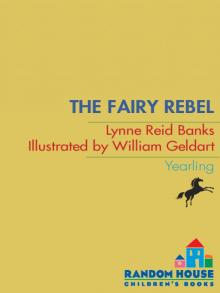 The Fairy Rebel
The Fairy Rebel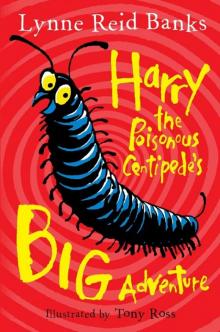 Harry the Poisonous Centipede's Big Adventure: Another Story to Make You Squirm
Harry the Poisonous Centipede's Big Adventure: Another Story to Make You Squirm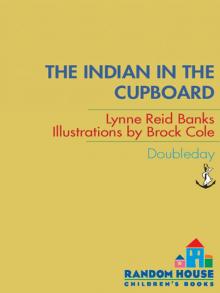 The Indian in the Cupboard
The Indian in the Cupboard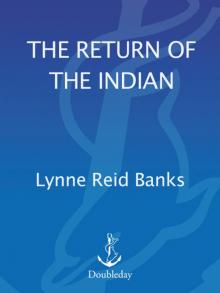 The Return of the Indian
The Return of the Indian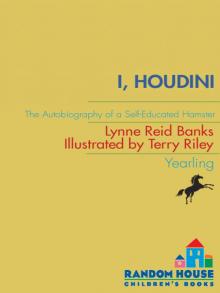 I, Houdini
I, Houdini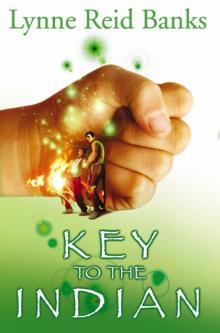 The Key to the Indian
The Key to the Indian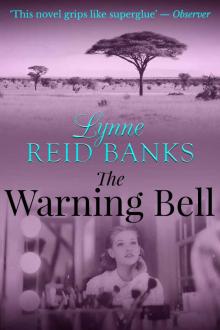 The Warning Bell
The Warning Bell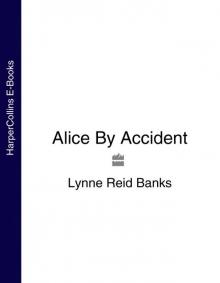 Alice by Accident
Alice by Accident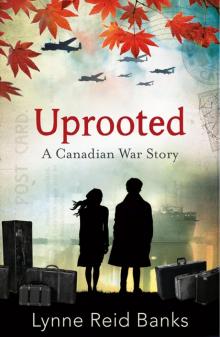 Uprooted
Uprooted Writing On the Wall
Writing On the Wall The Adventures of King Midas (Red Storybook)
The Adventures of King Midas (Red Storybook)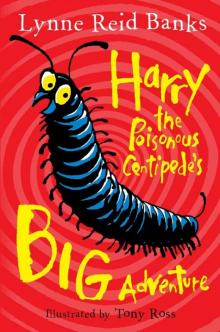 Harry the Poisonous Centipede's Big Adventure
Harry the Poisonous Centipede's Big Adventure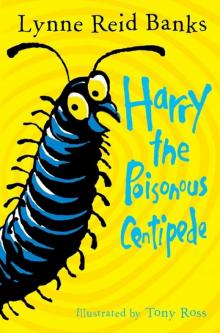 Harry the Poisonous Centipede
Harry the Poisonous Centipede The Dungeon
The Dungeon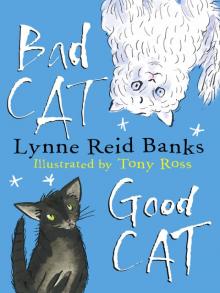 Bad Cat, Good Cat
Bad Cat, Good Cat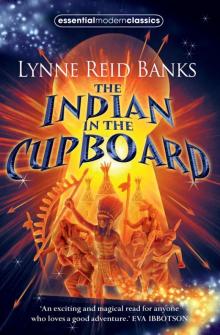 The Indian in the Cupboard (Essential Modern Classics, Book 1)
The Indian in the Cupboard (Essential Modern Classics, Book 1)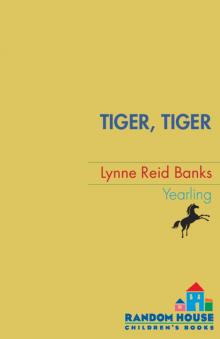 Tiger, Tiger
Tiger, Tiger